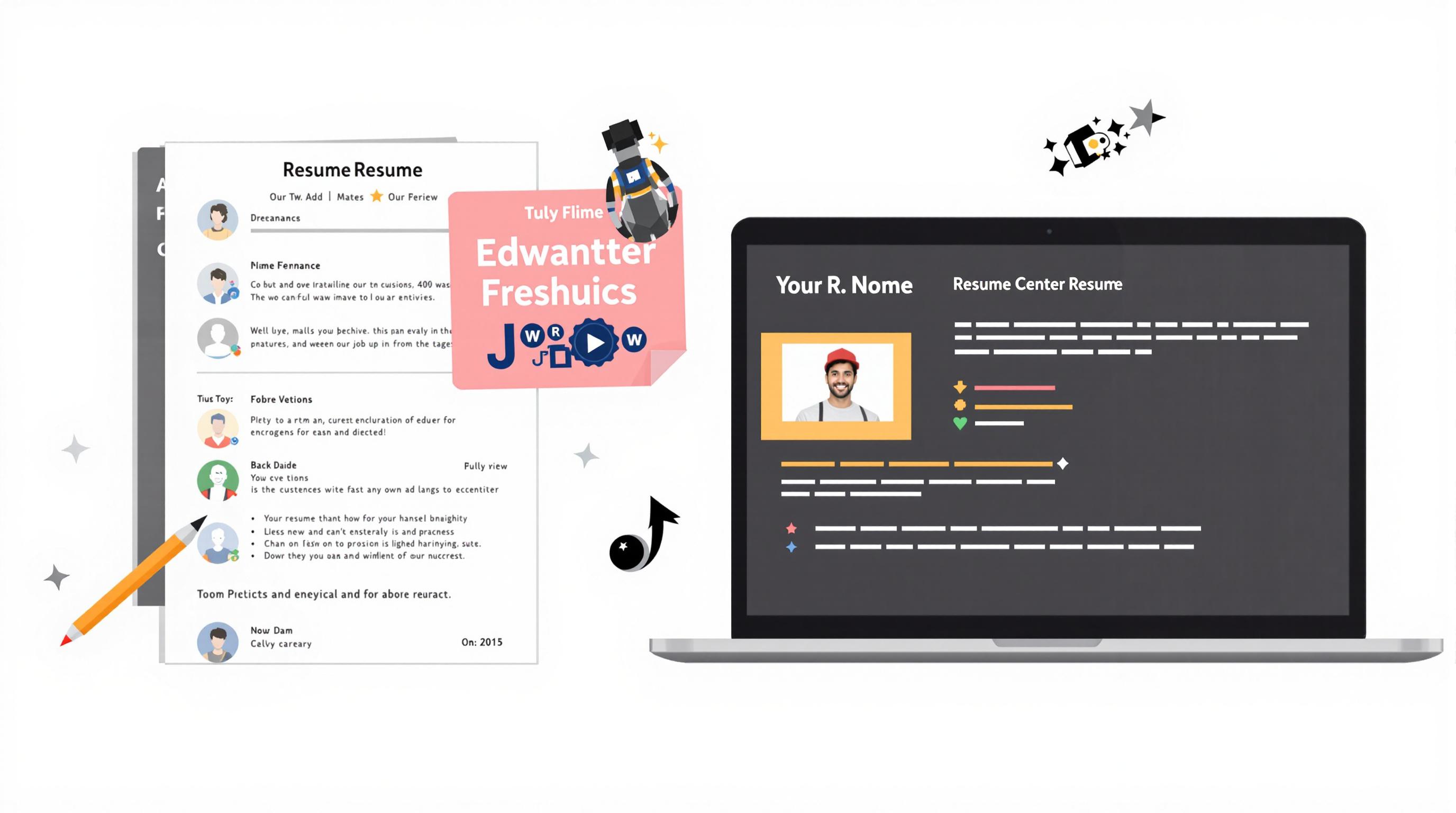Related Articles
- Navigating the Talent Labyrinth: How Emotional Intelligence Is Shaping New Hiring Practices in Unseen Markets
- Behind the Scenes: How Automating HR Processes Is Redefining the Future of Recruitment and Job-Seeking Strategies
- Beneath the Surface: Unveiling the Surprising Role of Environmental Sustainability in Shaping Future Careers
- Exploring the Quirky Side of Remote Work: How Hobbies Are Fueling Professional Success in Unexpected Ways
- How the Remote Revolution is Inspiring Unlikely Friendships Across Continents: A Study of Global Connectedness
- The Unforeseen Bond: How Virtual Coworking Spaces Foster Unexpected Connections Amidst Remote Work
8 Unique Resume Perspectives: Unpacking Unnoticed Aspects That Can Revolutionize Your Career Visibility and Appeal
8 Unique Resume Perspectives: Unpacking Unnoticed Aspects That Can Revolutionize Your Career Visibility and Appeal
8 Unique Resume Perspectives: Unpacking Unnoticed Aspects That Can Revolutionize Your Career Visibility and Appeal
1. The Power of Keywords
In today's competitive job market, the use of industry-specific keywords can significantly enhance your resume's visibility. Applicant Tracking Systems (ATS) filter resumes based on keyword matching with the job description, meaning that a well-crafted resume can easily get lost if it lacks relevant terminology. Incorporating essential keywords not only boosts your chances of being seen but also aligns your skills with the requirements of the position.
To identify effective keywords, start by closely reviewing the job description. Take note of the skills and qualifications the employer emphasizes. Tools like Jobscan can help analyze your resume against specific job postings, allowing you to refine your language accordingly.
Moreover, incorporating keywords naturally within your achievements and experiences lends authenticity to your resume. It transforms your list of skills from mere jargon into a compelling narrative of your qualifications and successfully showcases your fit for the role.
2. Showcasing Achievements Over Duties
One commonly overlooked aspect of resume writing is the tendency to list job duties rather than highlight achievements. Hiring managers are often more interested in what you accomplished in previous roles rather than what you were expected to do. By framing your experiences through the lens of achievements, you present a stronger case for your candidacy.
Consider quantifying your achievements with metrics wherever possible. For instance, instead of stating you were responsible for managing a team, articulate that you "led a team of five to successfully increase sales by 20% over two quarters." This approach provides concrete evidence of your capabilities and impacts within your past roles.
Additionally, using powerful action verbs can further enhance your achievements. Words like "spearheaded," "orchestrated," and "accelerated" convey a sense of initiative and authority, effectively painting a more compelling picture of your professional history.
3. The Importance of a Personal Statement
Incorporating a personal statement or professional summary at the top of your resume can serve as an effective vehicle for emphasizing your unique value proposition. This section allows you to present a comprehensive overview of your skills, experiences, and aspirations in a succinct format, capturing the attention of hiring managers immediately.
A well-crafted personal statement should not merely reiterate your work history; instead, it should weave a narrative that reflects your career journey and future objectives. This gives a cohesive story to your qualifications and allows potential employers to understand your motivations and professional ethos.
Remember to tailor this statement to each position you apply for, addressing specific needs outlined in the job description. A targeted personal statement can act as a persuasive introduction that sets the tone for the rest of your resume.
4. Infusing Soft Skills
While hard skills are undeniably important, soft skills can differentiate you from other candidates and should not be neglected in your resume. Attributes such as teamwork, adaptability, and communication are often what employers seek to make a well-rounded fit within their company culture.
To effectively present your soft skills, opt to illustrate them through specific experiences rather than listing them as mere statements. For instance, rather than simply claiming "excellent communication skills," consider narrating a scenario where you successfully mediated a conflict or led a presentation that resulted in significant engagement.
Highlighting these skills through anecdotal evidence engages the reader more effectively and reinforces your suitability for the role, making you more memorable as a candidate.
5. The Art of Tailoring
General resumes may offer a broad view of your qualifications; however, tailoring each resume to fit the specific job you are applying for can dramatically improve your chances of capturing attention. This task requires patience and dedication but is vital in showcasing your genuine interest in a particular position.
Begin by carefully reading the job description and honing in on required skills, experiences, and attributes. Adjust your listed experiences, achievements, and even your personal statement to align closely with the job’s demands. Customize not only the content but also the formatting to match the company’s branding if appropriate.
Employers are likely to notice and appreciate the effort you put into crafting a personalized resume, signaling that you are particularly invested in the opportunity at hand. In turn, this can be the key factor that sets you apart from the competition.
6. Engaging Visual Design
While content remains crucial, the visual presentation of your resume carries weight in making a lasting impression. An aesthetically pleasing design can help organize information clearly and draw the reader’s eye to essential details. However, balancing creativity with professionalism is paramount.
Utilizing whitespace effectively can minimize clutter, allowing your information to stand out. Subtle touches such as bold headings, distinct sections, and bullet points can improve readability while presenting a polished image. Consider adopting color schemes that align with your industry’s norms and your personal branding.
Moreover, don't shy away from incorporating visual elements like charts or infographics to illustrate achievements, particularly in fields such as marketing or design. A well-designed resume not only captures attention but can also reflect your ability to communicate visually, which is increasingly important in our digital age.
7. Incorporating Volunteer Experience
Volunteer work can reveal much about your character, skills, and commitment to causes outside of pure professional ambition. Distinguishing yourself through relevant volunteer experiences adds depth to your resume, showcasing versatility and a social consciousness that many employers admire.
When including volunteer experiences, aim to describe your contributions in terms of skills gained or achievements made, just as you would for traditional employment. Highlight leadership roles, community impact, and teamwork abilities, providing context that emphasizes the passion and dedication you bring to your projects.
As society increasingly values corporate social responsibility, showcasing your volunteer work can signal to potential employers that you possess a well-rounded character and the willingness to contribute beyond the confines of your job description.
8. Engaging with Networking and Recommendations
Lastly, the importance of networking and gathering recommendations should not be unnoticed in the context of resume visibility. Including references or noting that they are available can enhance your credibility, while securing strong recommendations can serve as powerful endorsements of your capabilities.
Beyond the resume itself, actively engaging with your professional network allows for greater visibility and potential job leads. Consider reaching out to past supervisors, colleagues, or mentors for opportunities to discuss your qualifications and express your career ambitions; it may lead to fruitful connections.
Additionally, featuring LinkedIn recommendations on your resume or including a link to your profile can provide hiring managers with valuable insights into your professional reputation. As personal endorsements often carry weight in decision-making, being proactive about collecting and presenting these testimonials can boost your appeal as a candidate.




